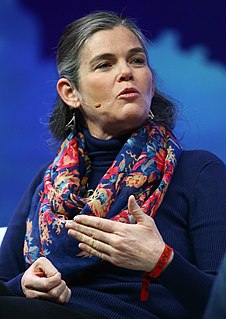Related Research Articles

Tongyangxi, also known as Shim-pua marriage in Min Nan dialects, was a tradition of arranged marriage dating back to pre-modern China, in which a family would adopt a pre-adolescent daughter as a future bride for one of their pre-adolescent sons, and the children would be raised together.

Robert Morris Sapolsky is an American neuroendocrinology researcher and author. He is currently a professor of biology, and professor of neurology and neurological sciences and, by courtesy, neurosurgery, at Stanford University. In addition, he is a research associate at the National Museums of Kenya.

Daphne Koller is an Israeli-American computer scientist. She was a professor in the department of computer science at Stanford University and a MacArthur Foundation fellowship recipient. She is one of the founders of Coursera, an online education platform. Her general research area is artificial intelligence and its applications in the biomedical sciences. Koller was featured in a 2004 article by MIT Technology Review titled "10 Emerging Technologies That Will Change Your World" concerning the topic of Bayesian machine learning.

Raymond Jeanloz is a professor of earth and planetary science and of astronomy at the University of California, Berkeley. Educated at the California Institute of Technology, Amherst College and at Deep Springs College, he has contributed research fundamental to understanding of the composition of the Earth and the behavior of materials under high temperatures and pressures. He is working with colleagues to investigate the conditions inside supergiant exoplanets. Jeanloz is also a prominent figure in nuclear weapons policy, chairing the Committee on International Security and Arms Control at the National Academy of Sciences. He was an Annenberg Distinguished Visiting Fellow at Stanford University's Hoover Institution from 2012 to 2013. He is a co-editor of the Annual Review of Earth and Planetary Sciences.
William A. Tiller is a professor emeritus of materials science and engineering at Stanford University. He is also the author of Science and Human Transformation, a book about concepts such as subtle energies beyond the four fundamental forces, which he believes act in concert with human consciousness. Tiller appeared in the 2004 film What the Bleep Do We Know!?.
Todd J. Martínez is a David Mulvane Ehrsam and Edward Curtis Franklin Professor of Chemistry at Stanford University and a Professor of Photon Science at the SLAC National Accelerator Laboratory.
Annual Reviews is an independent, non-profit academic publishing company based in San Mateo, California. As of 2021, it publishes 51 journals of review articles and Knowable Magazine, covering the fields of life, biomedical, physical, and social sciences. Review articles are usually “peer-invited” solicited submissions, often planned one to two years in advance, which go through a peer-review process. The organizational structure has three levels: a volunteer board of directors, editorial committees of experts for each journal, and paid employees.

The Annual Review of Anthropology is an academic journal that publishes review articles of significant developments in anthropology and its subfields. First published by Stanford University Press in 1959 under the name the Biennial Review of Anthropology, it became known as the current title in 1972 when its publication was assumed by Annual Reviews. Don Brenneis and Karen B. Strier have been the editors since 2013. As of 2021, according to Journal Citation Reports, the journal has an impact factor of 3.448, ranking it fifth out of 88 journals in the category "Anthropology".
Marcus William Feldman is the Burnet C. and Mildred Finley Wohlford Professor of Biological Sciences, director of the Morrison Institute for Population and Resource Studies, and co-director of the Center for Computational, Evolutionary and Human Genomics (CEHG) at Stanford University. He is an Australian-born mathematician turned American theoretical biologist, best known for his mathematical evolutionary theory and computational studies in evolutionary biology, and for originating with L. L. Cavalli-Sforza the theory of cultural evolution.

Winslow Russell Briggs was an American plant biologist who introduced techniques from molecular biology to the field of plant biology. Briggs was an international leader in molecular biological research on plant sensing, in particular how plants respond to light for growth and development and the understanding of both red and blue-light photoreceptor systems in plants. His work has made substantial contributions to plant science, agriculture and ecology.
Monika Schleier-Smith is an American experimental physicist studying many-body quantum physics by precisely assembling systems of ultracold atoms. These atomic, molecular, and optical physics (AMO) engineered systems have applications in quantum sensing, coherent control, and quantum computing. Schleier-Smith is an Associate Professor of Physics at Stanford University, a Sloan Research Fellow, and a National Science Foundation CAREER Award recipient. Schleier-Smith also serves on the board of directors for the Hertz Foundation.
Peter Thorpe Ellison is an American anthropologist who researches human reproductive ecology. His work has been recognized with a Guggenheim Fellowship and membership of the National Academy of Sciences, among other honors. He has also served as the editor-in-chief of the American Journal of Human Biology and American Journal of Physical Anthropology and editor of Annual Review of Anthropology.
Donald Bruce McCormick is an American biochemist who researched nutrition. His research focused on vitamins that were soluble in water and the processes of metabolism. He was recognized with a Guggenheim Fellowship and fellowship in the American Association for the Advancement of Sciences in 1966; he was editor of the Annual Review of Nutrition for ten years.
References
- 1 2 3 4 5 6 "William Durham". Counterbalance Foundation. Retrieved 9 September 2021.
- 1 2 3 4 5 "William H. Durham". MacArthur Fellows Program. MacArthur Foundation. Retrieved 9 September 2021.
- 1 2 3 4 "William Durham Senior Fellow, Emeritus Bing Professor in Human Biology, Emeritus". Woods Institute for the Environment at Stanford. 21 June 2018. Retrieved 9 September 2021.
- ↑ Durham, William H. (2008). "Preface: Keep Evolving!". Annual Review of Anthropology. 37 (1): annurev.an.37.091808.100001. doi:10.1146/annurev.an.37.091808.100001. ISSN 0084-6570.